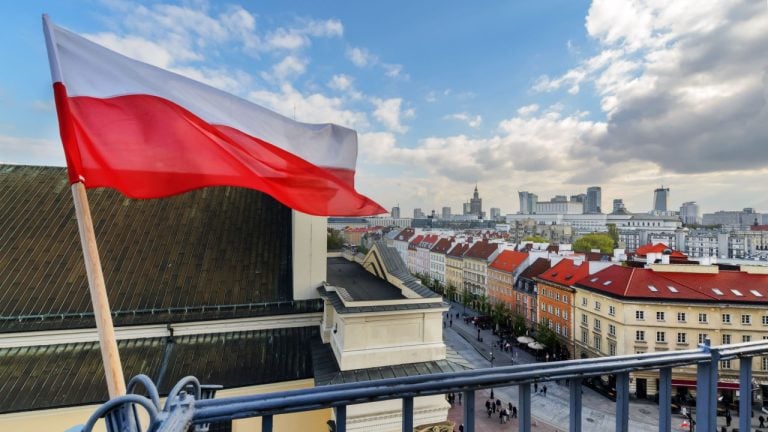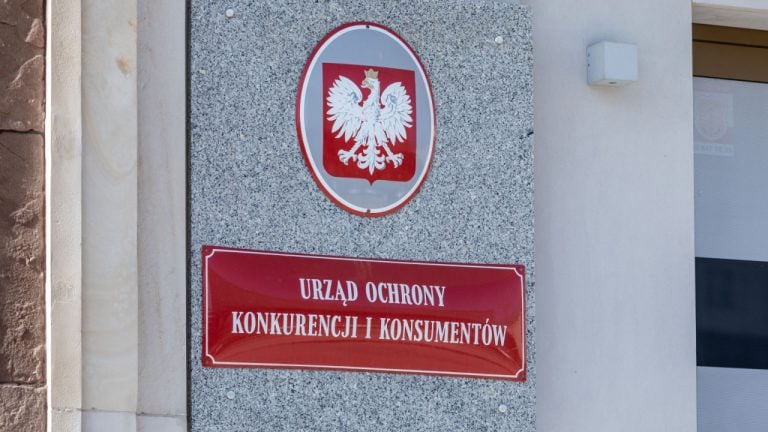 In a bold move that echoes recent calls from the U.S. to establish a Strategic Bitcoin Reserve, Sławomir Mentzen, a presidential candidate, has proposed that his country create its own Strategic Bitcoin Reserve. In a recent social media post, Mentzen outlined his vision for transforming Poland into a cryptocurrency haven, promising friendly regulations, low taxes, […]
In a bold move that echoes recent calls from the U.S. to establish a Strategic Bitcoin Reserve, Sławomir Mentzen, a presidential candidate, has proposed that his country create its own Strategic Bitcoin Reserve. In a recent social media post, Mentzen outlined his vision for transforming Poland into a cryptocurrency haven, promising friendly regulations, low taxes, […] European sanctions against Russia are impacting small European exporters, particularly in Italy, more severely than Russia itself, according to Ferdinando Pelazzo, president of the Italian-Russian Chamber of Commerce. Small and medium-sized enterprises (SMEs) are struggling with disrupted payment systems and logistical challenges due to the sanctions. Italian businesses heavily reliant on Russian markets now face […]
European sanctions against Russia are impacting small European exporters, particularly in Italy, more severely than Russia itself, according to Ferdinando Pelazzo, president of the Italian-Russian Chamber of Commerce. Small and medium-sized enterprises (SMEs) are struggling with disrupted payment systems and logistical challenges due to the sanctions. Italian businesses heavily reliant on Russian markets now face […] Worldcoin has expanded its orb verifications to Guatemala, Poland, and Malaysia amidst a wave of concerns regarding the dangers of artificial intelligence and the difficulty of identifying bots and humans online. The organization also debuted a new tech called Face Auth, which allows apps to check if the previously registered person is the one using […]
Worldcoin has expanded its orb verifications to Guatemala, Poland, and Malaysia amidst a wave of concerns regarding the dangers of artificial intelligence and the difficulty of identifying bots and humans online. The organization also debuted a new tech called Face Auth, which allows apps to check if the previously registered person is the one using […] Mark Karpeles, the former CEO of the infamous Mt. Gox exchange, is set to launch a new cryptocurrency exchange named Ellipx later this month. Based in Poland, Ellipx aims to prioritize transparency and compliance with the European Union’s Markets in Crypto-Assets (MiCA) regulation. The platform will initially operate as a crypto-only exchange, with plans to […]
Mark Karpeles, the former CEO of the infamous Mt. Gox exchange, is set to launch a new cryptocurrency exchange named Ellipx later this month. Based in Poland, Ellipx aims to prioritize transparency and compliance with the European Union’s Markets in Crypto-Assets (MiCA) regulation. The platform will initially operate as a crypto-only exchange, with plans to […]
In June, Belgium’s financial regulator ordered Binance to stop offering crypto exchange and custody wallet services, citing violations of the country’s AML and CFT requirements.
After an order from the Belgian Financial Services and Markets Authority (FSMA), crypto exchange Binance announced its Poland entity would be providing services to residents of Belgium.
In an Aug. 28 announcement, Binance said Binance Poland sp. z o.o. — an entity the exchange registered with Polish regulatory authorities in January — would comply with “regulatory obligations” for residents of Belgium looking for services on the exchange. According to Binance, some users may need to submit documentation in accordance with Know Your Customer requirements for Poland rather than Belgium.
The announcement came roughly two months after Belgium’s financial regulator ordered Binance to stop offering crypto exchange and custody wallet services, citing violations of the country’s Anti-Money Laundering and Combating the Financing of Terrorism requirements. At the time, FSMA suggested Binance could operate in Belgium via a “legal entity governed by the law of another member state of the European Economic Area [EEA] that is duly authorized by its home member state”. The EEA includes Poland.
Related: Binance to delist privacy tokens in France, Italy, Spain and Poland
A global crypto exchange operating in many countries through various entities, Binance has had a number of regulatory entanglements since its launch. The crypto exchange halted its services for Dutch users in July, citing a failure to obtain a virtual asset service provider license. In addition, Binance, Binance.US, and Binance CEO Changpeng Zhao are facing a lawsuit from the United States Securities and Exchange Commission.
The Markets in Crypto Assets legislation, a bill aimed at establishing a consistent regulatory framework for crypto assets among the European Union member states, is expected to take effect in 2024 following passage by policymakers. The framework is currently moving through a consultative phase for feedback on technical standards.
Magazine: Best and worst countries for crypto taxes — plus crypto tax tips

Those of us in Italy and surrounding countries will be allowed to continue trading Zcash, Monero and other coins that Binance sought to condemn as unworthy.
Privacy advocates scored a big win in June with Binance’s announcement that it was backtracking on a decision to delist privacy coins for users in a number of European countries.
As a result of the move, users in Italy, Poland, Spain and France will be permitted to continue trading tokens including Zcash (ZEC), Monero (XMR), Decred (DCR), Horizen’s ZEN, Verge (XVG), Dash (DASH), Secret (SCRT), Firo, Navcoin (NAV), MobileCoin (MOB), Beam and PIVX.
Banning the coins would have been a big, big mistake. Privacy coins empower individuals against financial surveillance by offering enhanced transactional security, and crypto communities should be thankful that Binance is no longer planning to remove them from its listings. In the modern climate of excessive surveillance and overall lack of confidentiality for users everywhere, their significance cannot be overstated.
Related: Binance was wrong to boot Monero, Zcash and other privacy coins
These coins’ fungibility, which makes each individual unit interchangeable and censorship-resistant, is an advantage they hold over almost every other cryptocurrency, and losing these additional layers of security and anonymity would have been an incredible loss for the community.
Privacy coins have gained traction in recent years due to the surfacing of a series of harsh regulations. Binance’s decision, in fact, comes on the heels of the European Union ironing out its much-discussed standards for digital assets, the recent Markets in Crypto-Assets (MiCA) regulations. Having just signed this into law, July will also see the European Securities and Markets Authority launch a MiCA consultation process. It’s fair to say that there’s quite some movement in the space, and we may not have seen the last of what Europe has in store for the crypto industry.

But the truth is that privacy is a fundamental human right protected by the United Nations. Article 12 of the United Nations’ Universal Declaration of Human Rights states that “no one shall be subjected to arbitrary interference with his privacy” and that “everyone has the right to the protection of the law against such interference or attacks,” so why should crypto be any different?
This concept is even more crucial in the digital era as data exploitation risks increase exponentially and tech giants have every tool at their disposal to try to prevent people from getting control over their private information.
As a matter of fact, Binance’s decision reflects the complex balance between regulatory compliance and users’ privacy needs that exchanges must strive for at all times, even as they face international regulations varying from country to country, and even as some countries decide to enforce stricter rules than others.
Related: SEC charges against Binance and Coinbase are terrible for DeFi
As for the future implications of the Binance decision — but also those stemming from the intense regulatory pressure looming over Europe — we could see a potential increase in the demand and, subsequently, the development of the privacy coins sector. Ironically, the precedent set by Binance could very well lead to more widespread acceptance of privacy coins, as it might prompt other exchanges to rethink their stance on privacy coins, potentially leading to wider availability. We shall see.
At the end of the day, this week’s news calls attention to the real power of community sentiment when it comes to shaping crypto policies and regulations. “We have revised how we classify privacy coins,” the official statement released by the cryptocurrency exchange read, “after carefully considering feedback from our community.” Reading between the lines, what’s clear is that the backlash they received in the past month worked.
It’s hard to overstate how necessary privacy in the crypto industry really is, and that’s why we cannot back down when it comes to fighting for it at every chance we get.
At the heart of it, the community’s influence on Binance’s decision demonstrates its power to shape the future of the crypto industry — and we’d do well not to forget that.
The crypto community should come together to continue fighting for privacy. It forms the very foundation of Web3. And, as the Romans used to say, ibi semper est victoria ubi est concordia: There is always victory where there is unity.
This article is for general information purposes and is not intended to be and should not be taken as legal or investment advice. The views, thoughts and opinions expressed here are the author’s alone and do not necessarily reflect or represent the views and opinions of Cointelegraph.

Lights, camera, Bitcoin: A Bitcoin Film Festival in Poland brought the Bitcoin revolution to the big screen.
The bear market might rage on, but that won’t stop the Bitcoin (BTC) shooters, creators and filmmakers from producing new content.
Hosted in the capital of Poland, Warsaw, the first edition of the Bitcoin Film Festival took place in March. The festival brought together Bitcoin advocates and film lovers from across the globe to sit through some of the best-known Bitcoin films and documentaries.
Hosted in the Kinoteka theater in the iconic Palace of Culture and Science, the Bitcoin Film Festival festival celebrated Bitcoin’s growing global influence while underscoring the thriving cultural movement that underpins the digital network. Some talents from the Bitcoin movement’s first film festival, BitFilm in 2015, such as Tomer Kantor, were in attendance, and they continue to shoot Bitcoin-centric films.
Cointelegraph premiered The Bitcoin Farmer, a short documentary about Bitcoin mining using solely renewable energy in Ireland. The film was followed by a panel discussion with Cointelegraph’s director of video, Jackson Dumont; global reporter, Joe Hall; co-founder of Bitcoin Film Fest, Pierre Corbin; and Mark Morton and Vince Giltinan from Scilling Digital Mining.

Pierre Corbin told Cointelegraph that he and co-founder Tomek Kolodziejczuk put together the Bitcoin Film Festival because it’s a “cool idea” for the community. Although the film fest was a valuable means of introducing Polish people to Bitcoin, Pierre explained that Bitcoin “has been very popular here in Poland with Ukrainians coming here because of the war.”
Poland borders Ukraine, with as much as 25% of Poland’s immigrant population being Ukrainian. At the outset of the war, Bitcoin donations soared, and Corbin explains that people on the ground used the decentralized tool:
“The human rights foundation helped them [Ukrainians] transfer their wealth into Bitcoin, helping them cross the border here into Poland and then walk them through the process of getting their money back out from Bitcoin ATMs because Poland is the country in Europe with the most Bitcoin ATMs.”
Kolodziejczuk set the ball rolling for the world’s first Bitcoin film festival in November 2022. He was keen to meet Corbin and screen his film, The Great Reset and the Rise of Bitcoin, at a local Bitcoin meetup. However, the idea snowballed. Their encounter and subsequent meetings led to the screening of Bitcoin movies from around the world in one of Eastern Europe’s most iconic buildings.

From documentaries shot in El Salvador, like Bond to Unbind, to a snapshot of the impact of Bitcoin on individuals’ lives in The Human B, the film festival showcased the most recent and notable film production efforts. Corbin explained the selection process:
“If you select the right films that tell the right stories, then bringing people from outside will understand Bitcoin from the angle that we want them to understand.”
A crowdfunding campaign was held through the Bitcoin crowdfunding campaign Geyser Fund, in which The Satoshi Mystery by Remi Baillieux won the community-voting segment. Meanwhile, Pierre raised Sats (the smallest denomination of a Bitcoin) for his second Bitcoin documentary, The Fight for the US Dollar.
Related: Film review: ‘Human B’ shows a personal journey with Bitcoin
The film festival also piggybacked off a Libertarian conference hosted in Warsaw the same weekend. Libertarians, or proponents of minimizing the state's encroachment on daily life, were some of the earliest adopters of Bitcoin.
The Bitcoin Film Festival is investigating whether to change the location for the 2024 installment or to keep the festival in Warsaw. While bear markets are undoubtedly for building, it appears they're also for filming.
Magazine: NFT Creator, Sarah Zucker: The Sarah Show’s analog past meets dizzying digital future
 Binance has unveiled intentions to broaden its activities in Poland, another EU member state where the global cryptocurrency exchange is registered. The coin trading platform plans to develop its Polish entity, recruit local talent and launch educational initiatives. Crypto Exchange Binance Moves Forward With Plans to Expand Operations in Poland Binance, the world’s largest digital […]
Binance has unveiled intentions to broaden its activities in Poland, another EU member state where the global cryptocurrency exchange is registered. The coin trading platform plans to develop its Polish entity, recruit local talent and launch educational initiatives. Crypto Exchange Binance Moves Forward With Plans to Expand Operations in Poland Binance, the world’s largest digital […] The body ensuring that consumer rights are respected in Poland has initiated proceedings against a crypto exchange falsely claiming to be Polish. The trading platform also misled customers that it was operating with the regulatory approval of the financial authorities in the country. Belize-based Exchange Risks Hefty Fine in Poland for Allegedly Deceiving Crypto Traders […]
The body ensuring that consumer rights are respected in Poland has initiated proceedings against a crypto exchange falsely claiming to be Polish. The trading platform also misled customers that it was operating with the regulatory approval of the financial authorities in the country. Belize-based Exchange Risks Hefty Fine in Poland for Allegedly Deceiving Crypto Traders […] During the past seven days, non-fungible token (NFT) sales have dropped 23.37% and 30-day statistics show NFT sales are down 63.10% from the month prior. While NFT interest has been waning, a recent study indicates that global regions like Singapore and Hong Kong lead the pack in terms of NFT interest. The research further suggests […]
During the past seven days, non-fungible token (NFT) sales have dropped 23.37% and 30-day statistics show NFT sales are down 63.10% from the month prior. While NFT interest has been waning, a recent study indicates that global regions like Singapore and Hong Kong lead the pack in terms of NFT interest. The research further suggests […]